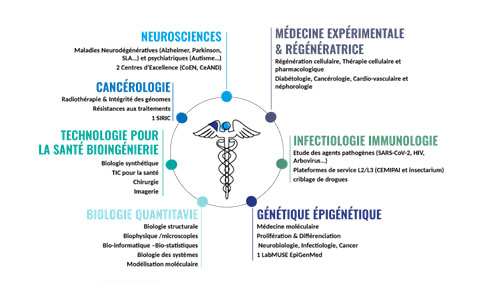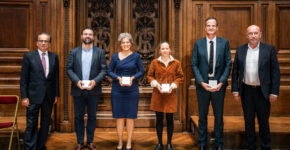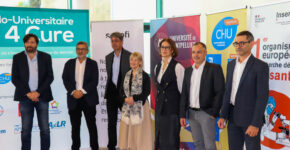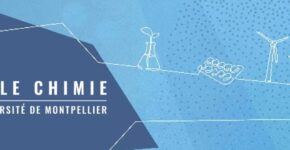Biology-Health Division
Five research clusters (Agriculture, Environment, Biodiversity; Biology-Health; Chemistry; Mathematics, Computer Science, Physics, Systems; Social Sciences) were created in September 2019 within the MUSE Foundation, then set up as intermediate structures of the University of Montpellier when the latter is created as an experimental public institution in 2022.
The Biology-Health research cluster provides a forum for scientific leadership and synergies between research structures and players, as well as a forum for scientific dialogue with a view to developing joint initiatives between the partners represented on the Strategic and Structuring Investment Committee (COMIS).
Cluster governance
Director of the Biology-Health Unit: Pierre-Emmanuel Milhiet
Head of administration and management: Laure Bourbon
Head of the Human Resources Commission (CRH) and Deputy Director: Jean-Yves Le Guennec
Manager of the Human Resources Commission (CRH): Magali Fayol-Chastaing
Strategic Orientation Committee (COS)
The Strategic Orientation Committee provides a link between Pôle de Research and its institutional partners. It participates in defining the Pôle de Research 's major scientific strategic orientations, and gives its opinion on the action plan proposed by the Director of the Pôle de Research.
Pole Council
The Conseil de Pôle issues advisory opinions on the direction and implementation of the Pôle's actions and strategy.
Executive Board
It includes members of the Pôle management team, 1 BIATS representative, 1 PhD student representative, representatives of the research areas and working group representatives.
Human Resources Commission (CRH)
The Human Resources Commission deals with issues specific to the staff of the University of Montpellier. Each Human Resources Commission issues an advisory opinion, in compliance with the statutory provisions specific to the Professors and Researchers corps.
Key figures
24 Biology-Health laboratories
8 Partner institutions
4 Research SupportUnits
3 Technology platforms
7 Thematic research axes
2 Doctoralschools (CBS2: Chemical and Biological Sciences for Health, SMH: Human Movement Sciences)
1 LabUM EpiGenMed
106 other PIA (Equipex...)
2Centers of Excellence : CoEN & CeAND
1SIRIC (Site de Research Intégrée sur le Cancer)
5FHUs (Fédérations Hospitalo-Universitaires)
6Infrastructures nationales
44 Start- up
8ERC (European Research Council)
1IUF (Institut Universitaire de France)
975 teachers and researchers
1581 PhD students / 7088 PhD students at UM
5062 publications
413 theses
233 industrial and R&D contracts
111 patents
41 CIFREgrants
over the period 2020-2025 :
3 ATIP/AVENIR teams
Partner establishments
- CIRAD - Centre for International Cooperation in Agronomic Research for Development
- CHU Montpellier - University Hospital of Montpellier
- CHU Nîmes - University Hospital of Nîmes
- CNRS - French National Center for Scientific Research
- ICM - Montpellier Cancer Institute
- INRAE - French National Research Institute for Agriculture, Food and the Environment
- INSERM - French National Institute for Health and Medical Research
- IRD - Institute of Research for Development
Missions du pôle
The Biology-Health Research Unit is responsible for :
- to set up a scientific coordination within the community on axes or thematic fields and to draw up a scientific prospective;
- promote and coordinate responses to calls for cross-sectoral, regional, national or international projects;
- participate in the deployment of the University of Montpellier's international strategy and visibility;
- propose concerted actions to promote the link between Training and Research ;
- take part in job and skills forecasting;
- to set up a "Human Resources" commission and ensure its operation, so as to produce opinions on issues specific to human resources in research at the University of Montpellier.
Scientific scope
- Partner institutions of the University of Montpellier involved in the Biology-Health Research Cluster.
- Research structures attached to the Pôle de Research Biologie-Santé.
- Support and Research Units (UAR).
- Technology platforms.
- Doctoral schools: CBS2 (Chemical and Biological Sciences for Health) & SMH (Human Movement Sciences).
- Training and Research Units (UFR), schools and institutes of the University of Montpellier in connection with the Biology-Health Research Cluster.
Research areas
The Pôle de recherche Biologie-Santé is organized into 7 thematic areas of research, teaching and outreach.
Each area is represented by an elected Professor representative (plus one deputy), an appointed Unit Director (DU) representative and an appointed University Hospital (HU) representative.

Quantitative Biology
Professor representative: Chérine Béchara (IGF)
+ alternate: Antoine Le Gall (CBS)
DU representative: Pierre-Emmanuel Milhiet (CBS)
HU representative: Nicolas Molinari (IDESP)
Quantitative Biology aims to understand the underlying principles of complex biological behavior in terms of physical and mathematical parameters. It is therefore an approach that concerns all areas of biology, and draws on technological know-how such as :
- Structural biology
- Biophysics and microscopy, from single molecule to tissue
- Bioinformatics (structural, genomics, etc.) and biostatistics
- Systems biology
- Multi-scale molecular modeling
This community comprises 40 research teams in 9 research units (CBS, CRBM, IGF, IGH, IGMM, IRIM, IRCM, LBN, LPHI).
The Quantitative Biology community, whose teams are supported by prestigious funding (ERC, ATIP-Avenir, Bettencourt-Schueller...), coordinates and/or participates in several projects labelled "Programme d'Investissements d'avenir": Integrative Structural Bioinformatics project (Bip-Bip) and 3 national infrastructures in the fields of optical imaging (France Bio-Imaging-FBI), structural biology (French Integrated Structural Biology Infrastructure - FRISBI) and chemoinformatics (ChemBioFrance). In addition, several teams working in this field are key players in prestigious international networks (Physics of Living Systems, LifeTime).
Oncology
Représentant chercheur Professor: Jacques Colinge (IRCM)
+ suppléante : Céline Gongora (IRCM)
DU representative: Nathalie Bonnefoy (IRCM)
HU representative: Guillaume Cartron (IGMM)
Montpellier's large cancer research community is involved in understanding the fundamental mechanisms of cancer, right through to improving its treatment.
It brings together some 50 teams in 10 joint research units under the supervision of the University of Montpellier, CNRS or Inserm (CBS, CRBM, IGF, IGH, IGMM, IRCM, IRIM, IRMB, LPHI, PhyMedExp), as well as 3 care centers (CHU de Montpellier, CHU de Nîmes and ICM).
The research excellence of this community is internationally recognized. It is reflected in national accreditations:
- SIRIC Montpellier Cancer" project accredited in 2013, 2018 and 2023 by INCa, DGOS and AVIESAN.
The SIRIC Montpellier Cancer is one of 8 Integrated Cancer Research Centers in France. Based on the American "Comprehensive Cancer Centers" model, it brings together on a single site a group of clinicians and researchers from the Montpellier Cancer Institute, the Montpellier University Hospital and eight research institutes affiliated with Inserm, CNRS and the two Montpellier universities. Drawing on multidisciplinary research teams (clinical, biological, physical, mathematical, human and social sciences) and cutting-edge technological platforms, the SIRIC Montpellier Cancer is currently implementing integrated, innovative research around three central themes - radiotherapy, prevention and supportive care, onco-metabolism - with the ultimate aim of transforming clinical practices in cancerology. - EvoCan" University Hospital Federation (FHU) project accredited in 2017 and 2023 by AVIESAN
Complementing and coordinated with the SIRIC, EvoCan will focus from 2023 on the development and clinical deployment of immunotherapies, which represent a major avenue in the fight against tumors. This concerns both antibodies targeting molecules that modulate the immune system and immunocellular approaches via genetically modified T cells (CAR-T cells). - Several Montpellier cancer teams are accredited by the Ligue Nationale Contre le Cancer, the Fondation pour la Research Médicale (FRM), or are part of LabEx "MabImprove" or LabMUSE "EpiGenMed" of the Montpellier MUSE I-Site.
Genetics-Epigenetics
Professor representative: Robert Feil (IGMM)
+ alternate: Rosemary Kiernan (IGH)
DU representative: Philippe Pasero (IGH)
HU representative: David Genevieve (IRMB)
The Montpellier Genetic-Epigenetic Community represents 22 teams in 14 research units (CBS, CRBM, DEFE, DMEM, IGF, IGH, IGMM, INM, Intertryp, IRCM, IRIM, IRMB, LPHI, PhyMedExp).
In 2010, as part of the "Investissement d'Avenir" program, the excellence of research in this field was recognized by the creation of the "EpiGenMed" Laboratory of Excellence. LabEx EpiGenMed has enjoyed remarkable success, with major discoveries made by its teams winning national and international awards and distinctions. EpiGenMed has been designated a Montpellier University Laboratory of Excellence (LabMUSE) as part of the I-SITE project. Its aim is to promote fundamental and clinical research by setting up interdisciplinary projects "to move from the genome and epigenome towards the molecular medicine of tomorrow". Research teams of excellence study the implications of genetics and epigenetics in cell proliferation and differentiation, normal development, neurobiology, infectiology and cancer, in close collaboration with the Montpellier research community.
This line of research also targets clinical applications in several fields. To this end, in 2018 Montpellier University Hospital entered into a partnership to promote the translation of discoveries from basic scientific research into medical research applications. Within this framework, the clinical teams of the Montpellier-Nîmes inter-hospital federation of medical genetics and molecular medicine (3 clinical units, 15 hospital laboratories) have joined the existing teams of the Genetics-Epigenetics research axis. This scientific integration aims to develop partnerships that will enable scientific discoveries in genetics and epigenetics to be combined with future medical applications.
Infectiology and Immunology
Représentant chercheur Professor: Nathalie Chazal (IRIM)
+ suppléant : Jean-Philippe Lavigne (VBIC)
DU representative: Matteo Bonazzi (IRIM)
HU representative: Edouard Tuaillon (PCCEI)
The Infectiology and Immunology community is organized along a continuum of Basic Research - Clinical Research - Population Health Research . It includes a University Hospital Federation (FHU) for "Infection and Chronicity" (InCh), 7 hospital departments at Montpellier and Nîmes CHUs, 17 research units (ASTRE, CBS, CRBM, IGF, IGH, IGMM, IMAGINE, Intertryp, IRCM, IRIM, IRMB, LPHI, MIVEGEC, PCCEI, TransVIHMI, VBIC), and a hospital platform (LECRII).
This community has a major international reach, with several laboratories located abroad (Africa, Asia, South America, in cooperation with IRD and CIRAD), and is heavily involved in numerous international projects on viral infections (HIV, Ebola, SARS-CoV-2, Arbovirus, HTLV-1, Influenza), parasitic infections (Plasmodium, Toxoplasma), bacterial infections (Mycobacterium, Coxellia, Brucella, Pseudomanas, Staphylococcus, antibiotic resistance and multi-resistance) and neglected tropical diseases (trypanosomiasis, leishmaniasis).
In addition to these projects and the exceptional technical facilities of the UAR BioCampus Montpellier, from which all Biology-Health researchers benefit, this community benefits from other more specific technical facilities such as those of the UAR CEMIPAI (Centre d'Etude des Maladies Infectieuses et Pharmacologie Anti-Infectieuse) and the stabling, breeding, experimental conditioning and experimentation infrastructures of the A2/A3 animal houses and the I2/I3 Insectarium.
Finally, we have developed important partnerships with major industrial groups and well-established SMEs, such as : Horiba, SANOFI-Aventis, Biorad, Abivax, Metafora, Deinove, Nosopharm, Azilead.
Experimental and Regenerative Medicine
Professor representative: Jean-Marc Brondello (IRMB)
+ alternate: Delphine Gitenay (IRMB)
DU representative: Alain Lacampagne (PhyMedExp)
HU representative: Christian Jorgensen (IRMB)
Experimental and Regenerative Medicine is the study of the mechanistic basis of pathologies and the development of new therapies based on tissue regeneration, cell therapy and pharmacology. To this end, the teams working in this area have developed unique models of target human pathologies, as well as patient cohorts, enabling innovative therapies to be tested.
This community comprises 27 teams in 9 research units (BC2M, DMEM, EuromovDMH, IGF, IGH, INM, IRMB, MMDN, PhyMedExp).
The excellence of this community is recognized by the accreditation of a National Health Biology Infrastructure: E-Cell France, which offers a range of services covering all phases of a cell therapy project, and by the AVIESAN accreditation of the RegenHab University Hospital Federation (FHU).
The RegenHab FHU is a clinical, biological and technological consortium bringing together stem cell biologists, physiologists, roboticists, specialists in complex movement imaging, and clinicians in rheumatology, muscular diseases, anesthesia-intensive care and rehabilitation. It develops new therapeutic approaches to restore movement in patients suffering from diseases that impair the function of musculoskeletal tissues.
Neuroscience
Sylvie Claeysen (IGF)
+ alternate Professor Fabrice Ango (INM)
DU representative: Sylvain Lehmann (INM)
HU representative: Philippe Marin (IGF)
The Montpellier Neuroscience Community brings together researchers, teacher-researchers and clinicians working in the Nîmes and Montpellier teaching hospitals and 30 teams in 6 research units (CRBM, IGF, IGH, IGMM, INM, MMDN).
It has 2 Centers of Excellence. The first, the AVIESAN-certified "CoEN" Montpellier Neurodegenerative Diseases Center of Excellence, focuses on biomarkers and personalized medicine. The center's aim is to foster the emergence of multidisciplinary projects bringing together fundamental, preclinical, clinical, epidemiological and social science research on diseases that are major public health issues, such as Alzheimer's, Parkinson's, Multiple Sclerosis and ALS.
The second is the Centre d'excellence sur l'Autisme et troubles du Neuro-Développement "CeAND", an interdisciplinary research and education network designed to foster interaction between researchers, professionals in the field and those concerned, with the aim of identifying the determinants of autism spectrum disorders/neurodevelopmental disorders, developing biomarkers for diagnosis and prognosis, and enabling personalized medicine. CeAND has also been accredited by the Délégation Interministérielle à la Stratégie Nationale sur l'Autisme as a neurodevelopmental disorder.
The Neuroscience Community also has a University Hospital Federation (FHU NEUROCLIN) whose aim is to structure neuroscience research in areas where the region has strong expertise (Sensorimotor Pathologies, Neurodegeneration, Cognition, Psychiatry), right through to clinical trials, and the creation of companies to develop new drugs or technological devices.
These structures of excellence work in close synergy, particularly in the biomarker field, through the sharing of multi-center cohorts, certified bio-banks and latest-generation technological approaches (NGS, quantitative mass spectrometry, multiplex and ultrasensitive immuno-detection, etc.).
Technology for Health - Bioengineering
Représentant chercheur Professor: Denis Mottet (EuroMov)
+ suppléante : Prisca Boisguérin (PhyMedExp)
DU representative: Stéphane Perrey (EuroMov)
HU representative: Maurice Hayot (PhyMedExp)
This area covers 4 main themes, ranging from synthetic biology to information and telecommunication technologies (ICT) for healthcare, surgery and imaging.
Bioengineering covers all in vitro diagnostic and/or analysis technologies, their implementation in living organisms and biomaterials.
Synthetic Biology is a recent discipline that combines biology and engineering to design new living biological systems for diagnostic and therapeutic applications. The teams involved in this field are the clinical teams at Montpellier University Hospital (endocrinology-diabetes, psychiatric emergencies and post-emergencies, wounds and scarring) and 31 basic research teams in 16 research units (BC2M, CBS, EuromovDMH, IGF, IGH, IGMM, INM, IRCM, IRIM, IRMB, LBN, Li2D, MMDN, PhyMedExp, Sys2Diag, TransVIHMI).
ICTs are being used more and more in chronically ill and elderly patients. They enable the collection and monitoring of biomarkers required for patient management, treatment adaptation and rehabilitation. The main teams involved in this field are from the Montpellier University Hospital (Nutrition Service, Clinical Physiology Department) and from
research teams such as PhyMedExp, LBN, Epsylon, EA MRM and the Institut des Mines d'Alès. In addition to clinical services and research laboratories, these activities are also carried out within 2 FHUs (ICT4CARE and REGENHAB).
An e-Health chair has been developed in this field within the Fondation Entreprendre of the University of Montpellier.
The "Surgery" theme covers not only surgical technologies, including teleoperation and associated materials and equipment, but also implantable devices, assistive devices and prostheses.
The Imaging theme covers all anatomical and functional imaging technologies, both in vitro and in vivo.
Research structures
- BioCampus Montpellier (BCM)
- Biocommunication in Cardiometabolics (BC2M)
- BioCentre Lunaret Montpellier (BIOLuM)
- Stem cells, cellular plasticity, tissue regeneration and immunotherapy of inflammatory diseases (IRMB)
- Center for the study of infectious diseases and anti-infectious pharmacology (CEMIPAI)
- Center for Structural Biology (CBS)
- Montpellier Cell Biology Research Center (CRBM)
- Embryonic Development, Fertility and Environment (DEFE)
- Muscle dynamics and metabolism (DMEM)
- EuroMov Digital Health in Motion (EuroMov DHM)
- Genopolys
- Initial Management and prevention of acute orGan failures IN critically ill patiEnts (IMAGINE)
- Institute of Human Genetics (IGH)
- Montpellier Institute of Molecular Genetics (IGMM)
- Institute of Functional Genomics (IGF)
- Montpellier Neuroscience Institute (INM)
- Montpellier Cancer Research Institute (IRCM)
- Montpellier Institute for Infectious Disease Research (IRIM)
- Desbrest Institute of Epidemiology and Public Health (IDESP)
- Host-Vector-Parasite-Environment Interactions in Neglected Tropical Trypanosomatid Diseases (INTERTRYP)
- Bioengineering and Nanosciences Laboratory (LBN)
- Laboratory of Pathogens and Host Immunity (LPHI)
- Molecular Mechanisms in Neurodegenerative Dementia (MMDN)
- Pathogenesis and Control of Chronic and Emerging Infections (PCCEI)
- Physiology and experimental medicine of the heart and muscles (PhyMedExp)
- Translational research on HIV and endemic and emerging infectious diseases (TransVIHMI)
- Bacterial virulence and chronic infections (VBIC)
Partnered research structures:
Technology resources
UAR BIOCAMPUS
BioCampus Montpellier is a Research Support Unit (UAR 3426 CNRS - US 09 INSERM - UM) of the Biology-Health and Agronomy/Environment/Biodiversity Clusters. It groups together 12 high-level technology platforms. The UAR offers its services both to research units and to industry.
- Pharmacology Interactome Screening (Arpege)
- Baculovirus & therapy (BACFLY)
- Drosophila (DROSO)
- International ImMunoGeneTics information system (IMGT)
- Small Animal Imaging Montpellier (IPAM)
- Montpellier Alliance for Metabolomics & Metabolism Analysis (MAMMA)
- Montpellier DNA Combing (MDC)
- Montpellier Genomic Collections (MGC)
- Montpellier Genomix (MGX)
- Montpellier Ressources Imagerie (MRI)
- Integrated Platform for Biophysics and Structural Biology (PIBBS)
- Montpellier Organoid Platform (POM)
- Montpellier Proteome Cluster (PPM)
- Montpellier Vectorology Platform (PVM)
- Réseau des Animaleries de Montpellier (RAM)
- Montpellier Experimental Histology Network (RHEM)
- Statistics applied to biology (StatABio)
- Zebrafish and Xenopus Platform (ZEFIX)
UAR CEMIPAI - Center for the Study of Infectious Diseases and Anti-Infectious Pharmacology
UAR 3725 CEMIPAI is a service platform under the auspices of CNRS and the University of Montpellier. It offers in vitro research services on class 3 viruses, bacteria, prions, micro-organisms and highly pathogenic toxins.
Platform: CECEMA - Centre d'Elevage et de Conditionnement Expérimental de Modèles animaux
The CECEMA technical platform is a joint service of the University of Montpellier; it is part of the RAM (Réseau des Animaleries Montpelliéraines) and is designed to house animals needed for scientific research and teaching.
BNIF - BioNanoImaging Foundry
The BNIF technology platform at the University of Montpellier is equipped with cutting-edge equipment that research teams working in instrumentation, methodology, image processing, biology-health and plant physiology use and continue to develop. The platform is formally attached to the MIPS department, but by its very nature has numerous interactions with the other Biology-Health, Agronomy and Chemistry divisions, which are the main users of the tools.
Pricing
Long-term thematic projects
PTL COSMIC - Complex Organoid Systems with Multifaceted Interactions
- Manager: Nathalie Chazal, IRIM
- Website
PTL HiLight - Intimate exploration of life: Analysis at high spatial and temporal resolution
- Manager: Julie Perroy, IGF
- Website
The I-SITE excellence program, led by the University of Montpellier, has decided to provide strong support for research through the creation of Long-Term Thematic Projects (PTLs). The overall aim of these programs is to support research in Montpellier, bring new scientific fronts to the fore and support training through research. After consultation with our community, and discussions organized by the Biology-Health Cluster, two PTLs in Biology-Health have emerged. The first concerns the development of new experimental models for tomorrow's translational research (called COSMIC), and the second concerns the high-resolution spatial and temporal analysis of living organisms (called HiLight).






